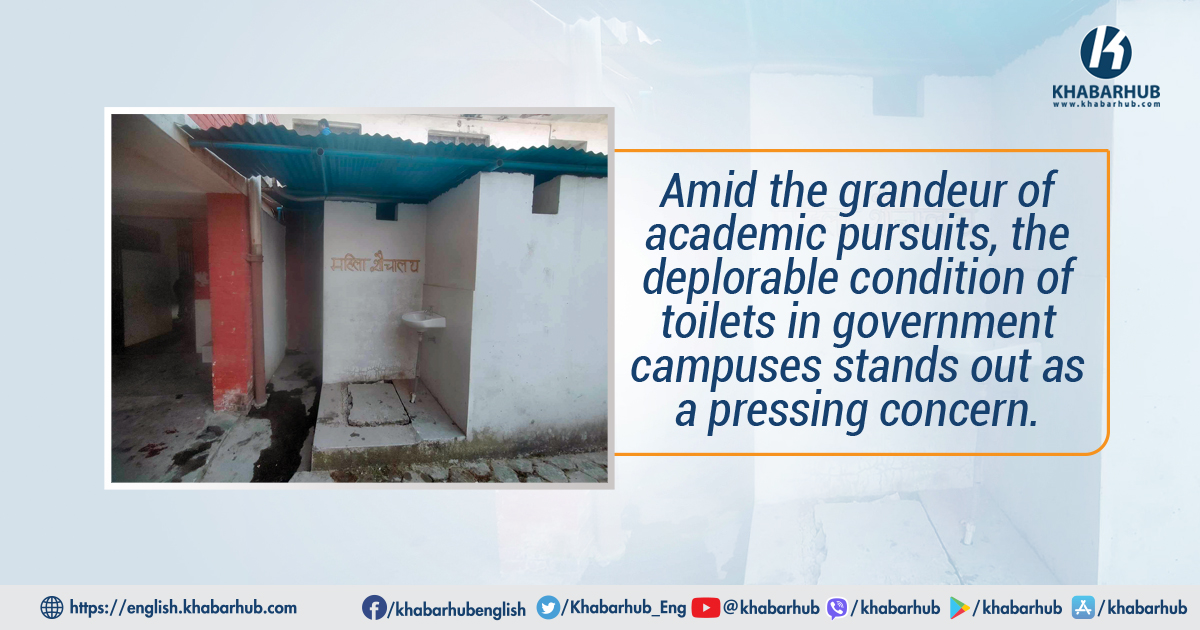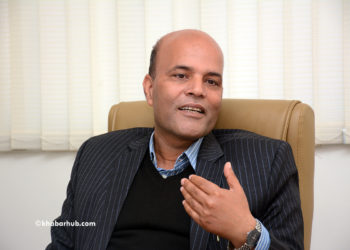KATHMANDU: Tribhuvan University (TU), the venerable institution that recently hosted its convocation ceremony, witnessed a plethora of aspirations as graduates embarked on new journeys.
Amid the pride of receiving certificates from the President and Prime Minister, some announced plans to pursue further studies abroad.
However, behind the façade of academic celebration, the university grapples with challenges that tarnish its reputation.
Excessive politicization has led to a dwindling student population, and administrative inefficiencies prevent the implementation of even the published annual examination calendar.
Under the current political leadership, Tribhuvan University students, the intellectual torchbearers of the nation, delve into diverse aspects of education.
Beyond the confines of a three-hour examination, they explore the realms of education, health, food, and the social fabric of the country.
Shedding light on the issue, this investigation focuses on the sanitation conditions at the renowned Kathmandu campus, a beacon for millions of students.
Our exploration begins at Patan Campus in Patan Dhoka, Lalitpur.
Despite the outward appearance suggesting order, the state of the campus toilets is appalling.
Stepping into these facilities feels akin to navigating through disarrayed village school toilets.
Laxman Giri, a student in this predicament, reveals how the smell gives him headaches, making a 45-minute class feel like an unbearable hour. Bikash Acharya, a third-year BA student, laments the pervasive unpleasantness in both men’s and women’s toilets, labeling it a fundamental failure of the campus administration.
Surprisingly, neither the campus administration nor the student union officials seem to prioritize or have a clear agenda for managing this critical aspect of hygiene. Shockingly, some campuses in Kathmandu lack toilets altogether.
Moving on to Ratna Rajya Laxmi Campus (RR) on Exhibition Marg in Kathmandu, established in 2018, it stands as the largest campus in the country for humanities and sociology studies.
Operating in three shifts—morning, afternoon, and evening—it plays a pivotal role in shaping undergraduate and postgraduate education.
However, the sanitation situation in this influential institution leaves much to be desired.
Amid the grandeur of academic pursuits, the deplorable condition of toilets in government campuses stands out as a pressing concern.
The lack of flushing mechanisms and water availability creates an unsanitary environment that not only reflects poorly on the institutions but also raises questions about the government’s commitment to providing a conducive learning atmosphere.
Addressing these sanitation challenges becomes imperative for safeguarding the dignity and integrity of educational institutions in Nepal.
While RR Campus stands tall as the largest humanities and sociology study hub in the country, a disconcerting reality unfolds within its walls.
Despite the seemingly well-maintained exterior of the toilet building, entering these facilities triggers an immediate need to cover one’s nose and mouth.
A harsh reality confronts the 4-5 thousand students who attend RR Campus daily – the absence of organized and sanitary toilets.
Mariyam Bhattarai, a third-year BA student at RR Campus, highlights the struggle faced by women students due to the lack of menstrual hygiene management facilities in the women’s toilets.
She remarks, “Our women’s toilets are not organized, posing extreme difficulties, especially during menstruation.”
Another student, Rupa Mainali, expresses how the unorganized state of the toilets has adversely affected her studies. In a time when cleanliness is emphasized in modern civilization, the foul odor emanating from these facilities brings shame to the educational institution.
They highlight difficulties faced during defecation, urging the school administration to prioritize comprehensive toilet management by deploying sanitation staff.
Rupa raises a poignant question, asking whether a basic provision such as soap is too much to expect in a toilet.
Despite students repeatedly drawing attention to these issues with the campus administration, there has been no visible improvement.
The pain is compounded for female students, as the installation of a pad machine has not translated into actual access to pads.
The stench from the toilets is not limited to discomfort; it directly impacts students’ studies.
Those attending classes near the upper-level men’s toilets find themselves unable to concentrate due to the overpowering odor.
Laxman Giri, a student in this predicament, reveals how the smell gives him headaches, making a 45-minute class feel like an unbearable hour. Bikash Acharya, a third-year BA student, laments the pervasive unpleasantness in both men’s and women’s toilets, labeling it a fundamental failure of the campus administration.
In response to the ongoing sanitation crisis, the campus administration shifts blame to the students, asserting that the campus lacks the necessary resources for deodorizing the toilets.
However, Bikash counters this, stating that the college administration’s failure is evident. He advocates for seeking external assistance, either from donors or agencies, to rectify this campus-wide issue that not only compromises the learning environment but also poses health risks.
Despite RR Campus’s historical significance and its role in producing eminent politicians, journalists, and artists, the critical aspect of toilet management has been neglected.
Bishnu Devkota, a second-year BA student, emphasizes the urgent need for attention to address this long-standing issue within the established campus with a rich history.
“There are complaints that it is difficult to sit in the classroom because the men’s toilet is right below the classroom,” Shrestha admits, assuring intensive discussions to facilitate a swift relocation of the classroom.
The state of both men’s and women’s toilets at RR Campus raises concerns, with students emphasizing the urgent need for organized reconstruction of the old structures.
They highlight difficulties faced during defecation, urging the school administration to prioritize comprehensive toilet management by deploying sanitation staff.
Jung Tamang, echoing the sentiments of many, expresses the profound shame associated with using the campus toilets.
He remarks, “As soon as they go to the toilet, it seems that tears come out of everyone’s eyes. When you have to go to the toilet, it is like committing a big crime and going there.”
The campus administration, acknowledging the issue, admits to the disorder in the current state of toilets.
Rabindas Shrestha, Assistant Campus Chief of RR Campus, assures that discussions are underway to address the problem promptly.
Shrestha explains that the men’s toilet, located near the classroom, was relocated due to a persistent bad smell originating from an old, problematic well during the rainy season.
“There are complaints that it is difficult to sit in the classroom because the men’s toilet is right below the classroom,” Shrestha admits, assuring intensive discussions to facilitate a swift relocation of the classroom.
As the campus shapes future legal professionals, addressing these basic yet crucial sanitation issues becomes imperative for maintaining a conducive learning environment.
He acknowledges the problem with women’s toilets and pledges immediate placement of cleaning supplies.
Shrestha points out that despite daily cleanliness directives, issues persist due to lapses on the part of both cleaning staff and students.
He urges students not to litter indiscriminately and acknowledges the staffing constraints that exacerbate the problem.
Meanwhile, students at Nepal Law Campus, responsible for producing future lawyers and justices, raise a different concern — an acute shortage of water in the toilets.
Krisal Thapa voices his experience, stating that despite toilets on every floor, water scarcity is a significant issue.
Thapa emphasizes the importance of clean water for human life and details challenges ranging from unusable toilets on lower floors to intermittent water supply on upper floors.
Sadikshya Dhungana adds her perspective, noting variations in cleanliness across different sections of the campus toilets.
Students at Trichandra Campus and Sankardev Campus, both under Tribhuvan University, echo similar concerns about unsanitary conditions in their respective toilets.
She emphasizes that water scarcity compounds the problem, impacting the overall hygiene and usability of the facilities.
As the campus shapes future legal professionals, addressing these basic yet crucial sanitation issues becomes imperative for maintaining a conducive learning environment.
Adding to the litany of concerns regarding campus hygiene, students are now shedding light on the absence of basic amenities in the toilets.
One student, Supriya Sutihar, highlights the lack of handwash facilities in the toilets, pointing out the alarming oversight.
When asked whether this issue was brought to the attention of campus administration, Sutihar laments, “Officials have been informed numerous times, but regrettably, no action has been taken.”
In addition to the absence of handwash, the dearth of water further compounds the problem, leaving students to wonder about the condition of the toilets. Sutihar candidly reveals, “There is no soap, only cleaning soap.”
This revelation underscores the challenging situation faced by students, particularly those with different abilities, as the big campuses in the valley struggle to provide disabled-friendly facilities.
The university administration must demonstrate sensitivity by addressing the pressing need for clean water, hygienic toilets, and wholesome food, fostering a truly study-friendly educational atmosphere.
Students at Trichandra Campus and Sankardev Campus, both under Tribhuvan University, echo similar concerns about unsanitary conditions in their respective toilets.
Sanju Badu, a student at Sankardev, attributes these issues to inadequate construction standards for toilets.
He emphasizes that the toilets across school campuses lack proper construction, with some lacking water, doors, or even being left unused.
The construction of toilets should adhere to standards, incorporating water tanks, dustbins, basins, electric lights, pans, and ventilation to ensure disabled-friendly facilities.
Unfortunately, not all campuses have adhered to these standards, leading to a polluted educational environment and students enduring unnecessary hardships.
Dilapidated toilet buildings with no water system, dustbins, or soap present immediate obstacles to students.
These challenges not only impact the overall well-being of students but also force them to carry drinking water on their own.
An educational institution, often regarded as a temple of knowledge, should prioritize a clean and conducive environment for learning.
The university administration must demonstrate sensitivity by addressing the pressing need for clean water, hygienic toilets, and wholesome food, fostering a truly study-friendly educational atmosphere.









Comment